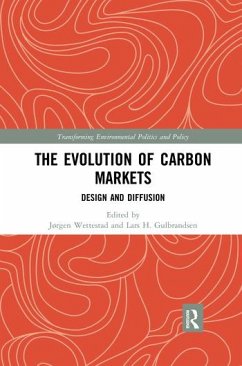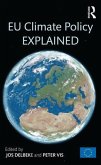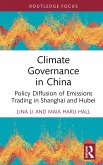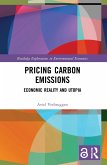Carbon markets are developing and expanding around the world, but how and to what extent is their design shaped by learning and interaction between them? How do these markets function and what is the role of design?
Carrying out a ground-breaking analysis of their design and diffusion, this book covers all the major carbon market systems and processes around the world: the EU, RGGI, California, Tokyo, New Zealand, Australia, China, South Korea and Kazakhstan. It offers a systematic, in-depth discussion and comparison of the key design features in these systems with expert contributors exploring how, and to what extent, these features have been shaped by central policy diffusion mechanisms and domestic politics.
By focussing on the specific design features of the instruments used, this volume makes important contributions to diffusion theory, highlighting how ETS diffusion processes more often have resulted in design divergence than convergence,and discussing the implications of this finding for the vision of linked systems in the post-Paris era. It will be of significant interest to a broad audience interested in the emergence, evolution, functioning and interaction of carbon markets.
Carrying out a ground-breaking analysis of their design and diffusion, this book covers all the major carbon market systems and processes around the world: the EU, RGGI, California, Tokyo, New Zealand, Australia, China, South Korea and Kazakhstan. It offers a systematic, in-depth discussion and comparison of the key design features in these systems with expert contributors exploring how, and to what extent, these features have been shaped by central policy diffusion mechanisms and domestic politics.
By focussing on the specific design features of the instruments used, this volume makes important contributions to diffusion theory, highlighting how ETS diffusion processes more often have resulted in design divergence than convergence,and discussing the implications of this finding for the vision of linked systems in the post-Paris era. It will be of significant interest to a broad audience interested in the emergence, evolution, functioning and interaction of carbon markets.
"In a globalized world, characterized by competition and opportunities for emulation and learning, emissions trading systems in different jurisdictions might be expected to converge toward a common design. Instead, over the last twenty years, designs of these systems have diverged in numerous ways. The Evolution of Carbon Markets shows that "diffusion" can usefully be redefined to include learning and adaptation leading to policy divergence. Divergence - whether as a result of diffusion or autonomous action - is generated by the fact that interests and the configurations of potential winning coalitions vary across jurisdictions. The design of emissions trading systems is profoundly shaped by domestic politics." - Robert O. Keohane, Professor of Public and International Affairs, Emeritus, Princeton University
"This is an important and enlightening book that should be required reading for students, scholars, and policy-makers interested in carbon markets and climate change. Providing an unparalleled picture of the global status of carbon markets, it is the most comprehensive examination of the politics of emissions trading systems available. By bringing together both domestic political dynamics and international diffusion processes in one analytic framework, the volume provides insight into the widespread adoption of emissions trading and the ways that is has developed in different ways in diverse places. The insights developed in the volume have significant implications for the development of global carbon markets and lay bare the opportunities and challenges for emissions trading to play a major role in the global response to climate change." - Matthew Hoffmann, Professor of Political Science, University of Toronto, Canada
"Emissions trading has emerged as a key policy response to the urgent problem of global climate change. Yet little is still known about how and why a diversity of countries, regions and cities have embraced the policy instrument. By bringing together an impressive range of case studies - from California to China - this book underscores the context-specific nature of emissions trading, and provides timely insights into the prospects for a global carbon market." - Harro van Asselt, Professor of Climate Law and Policy, University of Eastern Finland
"This is an important and enlightening book that should be required reading for students, scholars, and policy-makers interested in carbon markets and climate change. Providing an unparalleled picture of the global status of carbon markets, it is the most comprehensive examination of the politics of emissions trading systems available. By bringing together both domestic political dynamics and international diffusion processes in one analytic framework, the volume provides insight into the widespread adoption of emissions trading and the ways that is has developed in different ways in diverse places. The insights developed in the volume have significant implications for the development of global carbon markets and lay bare the opportunities and challenges for emissions trading to play a major role in the global response to climate change." - Matthew Hoffmann, Professor of Political Science, University of Toronto, Canada
"Emissions trading has emerged as a key policy response to the urgent problem of global climate change. Yet little is still known about how and why a diversity of countries, regions and cities have embraced the policy instrument. By bringing together an impressive range of case studies - from California to China - this book underscores the context-specific nature of emissions trading, and provides timely insights into the prospects for a global carbon market." - Harro van Asselt, Professor of Climate Law and Policy, University of Eastern Finland








